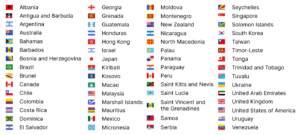I’m Gilly Bachelor, your dedicated travel expert, here to guide you through the essential ETIAS requirements for a seamless European adventure. Whether you’re visiting for business, leisure, or a quick stopover, it’s crucial to understand the European Travel Information and Authorisation System (ETIAS) to ensure a hassle-free journey.
The UK is facing a significant transition with the introduction of the EU’s Entry-Exit System (EES), which is expected to take effect in November 2024. This new system will replace traditional passport stamping with biometric checks, adding a layer of security but also potentially extending processing times at border points. The new European Travel Information and Authorisation System (ETIAS) will start in May 2025.
Understanding the Changes – EES
The EES will require travellers crossing EU borders to submit biometric data, such as fingerprints and photos, which will be stored for three years. This change aims to enhance border security but might lead to longer wait times, especially at busy entry points like London St Pancras International station and the Port of Dover.
Understanding the Changes – ETIAS
ETIAS travel authorisation is an entry requirement for visa-exempt nationals (including British Citizens!) travelling to any of these 30 European countries.

***However, please note that there is a question-mark around Cyprus so more information to follow on this one!
Eligibility Criteria
Knowing if you need an ETIAS is step one. You are visa-exempt and require an ETIAS if you are from the following countries:

- Travel Purpose: ETIAS is for short-term travel (up to 90 days within 180 days) for tourism, business, transit, or medical reasons.
- Passport: Ensure your passport is valid (less than 10 years old plus 3 months from the date of your return), machine-readable, and ideally, an electronic passport with a chip.
- Age and Fees: While ETIAS is required for all ages, those under 18 or over 70 are exempt from the application fee.
- Health and Security: You must have no significant criminal record and pose no security threat. Health issues posing public risks may also affect eligibility.
- Previous EU Denials: Past entry denials to the EU can lead to additional scrutiny or ineligibility.
Application Process
- Prepare Documents – have a valid biometric passport that’s less than 10 years old and doesn’t expire within three months of your return from the EU.
- Access the Form – visit the official ETIAS website or use the mobile app to find the application form (beware of fraudulent websites!).
- Fill in Personal Information – provide details like your name, birthdate, nationality, home address, parents’ names, contact info, travel document details, education, occupation, and travel intentions.
- Review and Confirm – double-check your information for accuracy. Mistakes can delay or deny your application.
- Pay the Fee – a €7 fee applies, payable online via credit or debit cards. Remember, applicants under 18, over 70, or family members of EU citizens are exempt.
- Submit – once paid, submit your application. Most are processed within minutes, though it can take up to 30 days if additional information or interviews are required.
- Wait for Approval – you’ll receive an email with your application number and, later, your ETIAS approval or rejection. Keep this email handy you will need to take it with you when you travel.
***remember your ETIAS is valid for three years, but if you change your passport within this time you will need to renew your ETIAS***
Government Action and Public Awareness
Immigration Minister Seema Malhotra has announced that the government is taking proactive steps to raise awareness of these changes. The campaign aims to inform travellers about the new requirements and encourage early preparation to minimise disruption. The government is working closely with French authorities, Eurostar, and Eurotunnel to streamline the implementation process.
Lobbying for a Grace Period
The UK is lobbying for a longer grace period beyond the initial six months, which would allow travellers more time to adjust to the new system without significant delays. This effort includes working with the European Commission and EU member states to potentially exempt certain passengers from biometric checks during this period. Once this grace period has elapsed you will be denied entry to these EU countries (see above) without an ETIAS.
Additional Measures at Ports
To further alleviate potential congestion, the UK has requested an additional French control zone at Dover’s western docks. This would be operated by French border control officers, similar to the current setup at the port’s eastern docks. Such measures aim to distribute the workload and reduce wait times for travellers.
Reassuring Safety and Efficiency
While these changes might seem daunting, they are designed to enhance security and efficiency at EU borders. By staying informed and planning ahead, you can ensure a smooth and enjoyable travel experience. The UK government is committed to working collaboratively with European partners to meet shared objectives, ensuring both secure borders and minimal disruption.
Final Thoughts
Travelling to Europe is an exciting experience, and with the right preparation, you can navigate these new border rules with ease, but don’t worry if you book your holiday with us we’ll ensure a seamless transition into this new era of travel.
